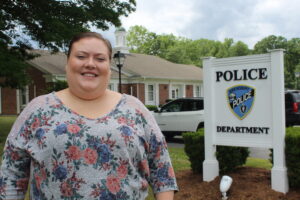
SHREWSBURY – The Shrewsbury Police Department responded to nearly 1,000 mental health calls between 2017 to 2021.
That marked a 38% increase from the previous five year period, according to Chief Kevin Anderson.
Enter Jessica Atwood, who is the department’s new jail diversion program co-response clinician.
“While our officers are excellent at what they do, we have to realize that they are police officers and not licensed mental health professionals with a formal education in the mental health field,” Anderson said in a recent press release.
Police note spike in mental health calls
Seeing the uptick in mental health calls, the department sought out a person to help provide a higher level of service to residents in a crisis.
Atwood, who started her role in April, told the Community Advocate last week that working with the Shrewsbury Police Department has been going “wonderful” so far.
“Everyone has been so welcoming,” she said. “It’s [a] change for everybody because this is a whole new position.”
“In a short period of time, from emergencies to follow ups, she’s been a tremendous asset,” Anderson said. “She built a really good relationship with the community.”
Atwood grew up near Lowell and Chelmsford, though she’s lived in Worcester County for the past six years.
She’s spent about 12 years in her current profession, working for the Framingham-based human services agency Advocates since 2016.
“I’ve always had an interest in psychology and criminal justice,” Atwood said.
Her first job in the field involved working as a mental health technician at Lowell General Hospital’s emergency room.
While she was working at the hospital, Atwood met clinicians who would evaluate patients in the emergency department.
“I asked a clinician once, ‘How do I get your job?’” Atwood recalled.
That question led her to go back to graduate school before ultimately interning and later being hired by Advocates.
Discussions about clinician date back years
As Anderson described it, the process of bringing on someone with skills like Atwood’s dates back to his interview to be chief.
Anderson put a one year strategic plan together, which included evaluating the department’s responses for mental health and individuals in crisis. Anderson wanted to look at training that focused on the department’s responses and its ability to identify people in crisis.
He was also interested in exploring whether the department should have a crisis intervention team and hire a mental health clinician.
Once he was formally hired as chief, Anderson indeed began closely reviewing the department.
“One of the things we determined was there was a need for a mental health clinician,” he said.
The police department received approval for funds for this position as part of the Fiscal Year 2022 budget.
Lt. Nick Perna then worked with Advocates, though, to secure an approximately $300,000 grant through the state Department of Mental Health.
The grant is good for three years, supporting Atwood’s position for that period. It also leaves a possibility that it could be renewed after that period.
Other communities bring in clinicians
In launching their co-response program, Shrewsbury joins other communities that have also worked with Advocates on similar efforts.
Such area communities include Hudson, Marlborough, Northborough, Southborough and Westborough.
The first Advocates co-response program was launched in Framingham in 2003. Marlborough replicated it in 2008. Hudson joined in 2018. Westborough, Southborough and Northborough have been partners since 2019.
Clinician begins work in Shrewsbury
Back in Shrewsbury, Atwood began working with the Shrewsbury Police Department in April after six weeks of training.
As part of her work, she co-responds with police officers to calls ranging from individuals in psychiatric crisis to domestic assaults to elder services cases.
“[I] assess them, help de-escalate the situation and get them the appropriate resources and treatment that they may need,” Atwood said.
She said this helps avoid “unnecessary” emergency room visits.
Shrewsbury officers have said that Atwood is a great asset to the department, Anderson said.
One of the department’s goals, likewise, is to redirect people with mental illness and substance use disorder to the healthcare system opposed to the judicial system.
Over the past year, all of Shrewsbury’s officers have completed several mental health trainings. Some have also been sent to crisis intervention training.
“At the end of the day, it’s the best outcome for the person involved,” Anderson said. “Having Jess on scene, she can know the cues to identify somebody with emotional problems or mental health issues and get them the appropriate services that they need.”
RELATED CONTENT
Jail Diversion program aims to assist police as well as communities

















